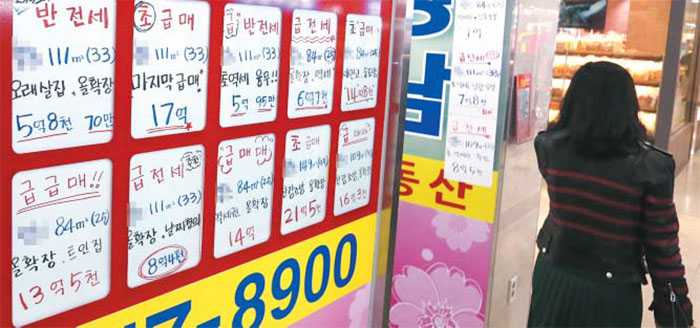Apartment Price Surge in Seoul Comes to a Halt
10 November, 2018

The explosive surge in apartment prices in Seoul has finally come to a halt for the first time in a year and two months and 56 days after the government took drastic steps to stem real estate speculation.
The Korea Appraisal Board on Thursday said apartment prices in Seoul were unchanged in the first week of November from the previous week.
They started surging in September 2017 and by late August they were increasing one percent every two weeks. The surge slowed when the government announced tough measures to curb speculation on Sept. 13 and has now apparently stopped.
In swish Gangnam south of the Han River, overheated prices already fell last month. Prices in Gangnam and Seocho districts fell 0.07 percent and in Songpa 0.1 percent.
Elsewhere, prices also fell in Dongjak, by 0.04 percent and in Yongsan by 0.02 percent. One realtor in Seocho said, "Even until late August, I had customers from outside Seoul lining up to buy apartments, but now there are virtually no buyers."
The reason for the halt is that it has become extremely difficult to borrow money from banks to buy an apartment in Gangnam. Chun Hyun-sook at the Korean Association for Housing Policy Studies said, "Almost 80 percent of people who buy apartments already own one home, and it's become too burdensome for them to buy another apartment for investment purpose as taxes have risen."
Once revised tax laws go into effect in January, multiple home owners and owners of one expensive apartment will be saddled with higher taxes.
The other reason is that prices are already too high for most buyers, so the increase had to stop somewhere. Lee Chang-moo at the Korea Real Estate Analysts Association said, "The government's measures had an effect, but buyers have also tired of rising apartment prices in Seoul."
But others say the rise is unstoppable in the long term. Apartment prices outside Seoul, where the new regulations do not apply, keep rising steeply.
"Apartment prices have stopped surging temporarily due to government measures, but there is still plenty of liquidity in the real estate market," said Shim Gyo-eon at Konkuk University. "As long as housing supply falls short of demand, prices can start rising any time again."
TAG(s):
